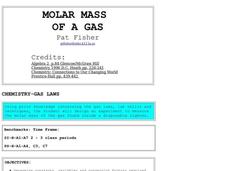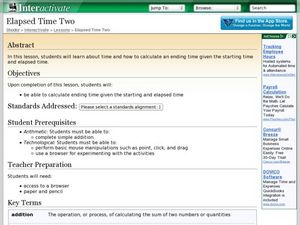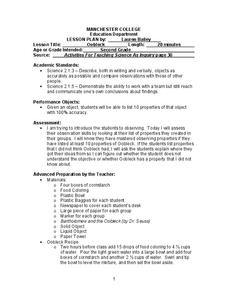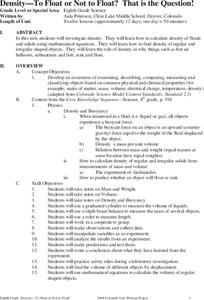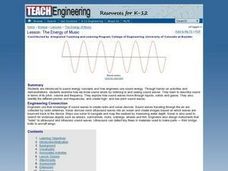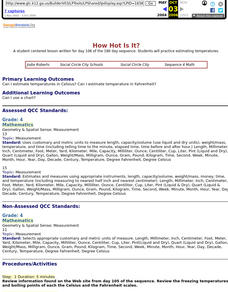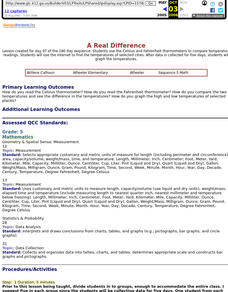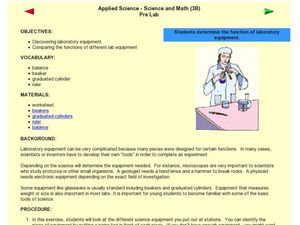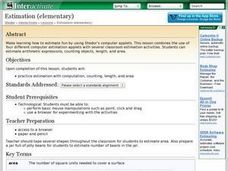Curated OER
Density and Buoyancy Lesson Plan
Students investigate why some objects float or sink in water. In this physics lesson, students calculate the density of clay ball using a mathematical equation. They write a complete lab report about the experiment.
Curated OER
Molar Mass
Young scholars apply the ideal gas law and Dalton's Law of Partial Pressure to develop an experiment which determine the molar mass of butane from disposable lighters. In small groups, they develop a procedure and have it approved...
Curated OER
Drip, Drip, Drip or The Case of the Leaky Faucet
Students explore the cost of wasted water. In this math lesson, students conduct an experiment in which they collect data on how much water is lost when a faucet leaks. Students figure the cost of the water that was wasted.
Curated OER
Elapsed Time Two
Learners study how to calculate elapsed time. In this elapsed time lesson plan, they determine how to calculate the ending time of an event when they are given the starting time and the elapsed time. They participate in direct...
Curated OER
Paper Packaging Design
Students create packages with a maximum capacity. In this geometry instructional activity ,students estimate using whole numbers, decimals and fractions. They calculate length, weight and mass of packaging.
Curated OER
Oobleck
Second graders observe the properties of Oobleck. In this science and observation instructional activity, 2nd graders examine Oobleck and make a list of 10 properties that they notice. They explain their observations.
Curated OER
Sea Ice and Sheet Ice Melting Experiment
Learners observe the change in water level as a result of melting sea ice and melting sheet ice.
Curated OER
Density - To Float or Not to Float? That is the Question!
Students investigate how to find the density of fluids and solids using math. Students also learn how to find the density of regular and irregular shaped objects.
Curated OER
Determining pH
Young scholars evaluate pH levels through a solubility experiment. In this pH levels lesson, students list characteristics of acids and bases. Young scholars complete their own pH level experiment. Students go to the GEMS Alien Juice Bar...
Curated OER
The Grouchy Ladybug
Students complete a Cirlce Map about time. They recall times during the grouchy ladybugs travels, and add dots on ladybugs using turn-around facts. Pupils correctly sequence the events of The Grouchy Ladybug. Students compose new...
Curated OER
Pyramids on Parade/Nets
Students sketch the shape of three dimensional pyramids using nets. In this geometry lesson, students differentiate a pyramid from other three dimensional shape. They define the attributes of pyramids.
Curated OER
Nuclear Fleas
Seventh graders distinguish characteristics of living things and identify the importance of careful observation. They identify five things that are not alive, but display characteristics of life and list five things that are alive, but...
Curated OER
The Stock Market
Twelfth graders study the stock market and how to read stock market pages. They write reports about and graph the performance of various stocks. They examine economic crashes in history and write and perform a skit about the market.
Curated OER
The Energy of Music
Students discover how engineers use sound energy. They participate in hands-on activities in which they discover how we know sound exists. They identify different pitches and frequencies as well.
Curated OER
Air and Water in the Environment
Second graders participate in a three part lesson in which they identify and describe forms of moisture in the environment. Part one of the lesson involves the three stages of the water cycle, part two focuses on creating humidity by...
Curated OER
Three Clouds Activity
Learners explore how clouds are produced through three different age-appropriate hands-on experiments.
Curated OER
Can You Get A Charge Out Of Matter?
Young scholars observe and demonstrate how objects can be charged positively and negatively and how static electricity works. They observe a teacher-led demonstration, and in small groups rotate through various static electricity...
Curated OER
How Hot Is It?
Fourth graders practice estimating temperatures. They practice in Celsius and Fahrenheit.
Curated OER
A Real Difference
Fifth graders use the Celsius and Fahrenheit thermometers to compare temperature readings. They use the Internet to find the temperatures of selected cities. After data is collected for five days, 5th graders graph the temperatures.
Curated OER
Applied Science -- Science and Math (3B) Pre Lab
Set up stations around your science lab to introduce youngsters to different equipment. They examine a beaker, graduated cylinder, ruler, balance, and thermometer. The said worksheet is not included, but you will find a few useful tips...
Curated OER
Using Multiplication to Solve Word Problems
Learners explore math functions by solving word problems in class. In this multiplication instructional activity, students utilize colored cubes and base blocks to visualize multiplication problems. Learners identify the multiplication...
Curated OER
Estimation Lesson Plan
Students use four different computer estimation applets with several classroom estimation activities.
Curated OER
Paper Packaging Design
Students discuss the relationship between technology and manufacturing. They then use their ideas to construct a model of a paper board carton package. Next they view a PowerPoint presentation to learn about the history of packaging...
Curated OER
Water Quality Monitoring
Students comprehend the four parameters of water quality. They perform tests for salinity, dissolved oxygen, pH and clarity or turbidity. Students comprehend why scientists and environmental managers monitor water uality and aquatic...



